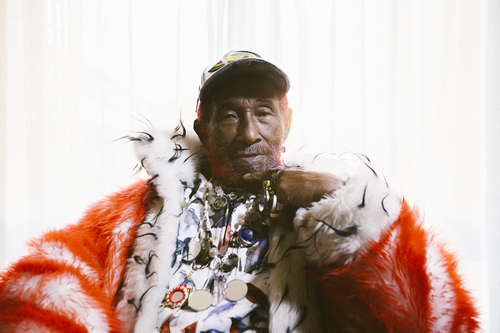Global Beat: Lee “Scratch” Perry (From the Archives)

Following yesterday’s news regarding Lee “Scratch” Perry’s passing, we share this piece from 2019.
***
With On-U Sound’s Adrian Sherwood riding shotgun, the original Upsetter uncorks a rootsy sound on Rainford and its dub-style follow-up, Heavy Rain.
As he gears up for a brief U.S. tour this fall, Lee “Scratch” Perry is feeling unusually frisky.
“Movement is very important,” he says over the phone from Negril, Jamaica, his sandpapery but evermelodic voice accentuating the point. “The more we travel and meet people, the stronger we get. And then, as we get stronger, we see more people that believe in God. They know that God is coming to save them one day. It’s like Bob [Marley] said: Jesus was a healer, and those who cannot be healed were not made to be healed. And those who are healed were made to be healed. And who feels, were made to be feeled. And those who squeal, were made to be squealed. And those who dream, were made to be dreamed. It’s all still a dream.”
He lets loose with a hearty laugh. Perry has never been one to take the world too seriously; even a cursory look at the long, humid path he’s blazed as a record producer at the forefront of Jamaican reggae is a testament to that ethos. From the pioneering sound of 1973’s Blackboard Jungle Dub, which he coengineered with dub godfather King Tubby, to the Congos’ righteous Heart of the Congos, as well as Super Ape, Roast Fish Collie Weed & Corn Bread and so many more classic productions from his legendary Black Ark studio, Perry has always gone his own way. And, in the process, he earned his many trickster-ish nicknames, including the one for which he’s most universally known: The Upsetter.
But what’s in a name? Perry’s latest album, Rainford, pulls its title from Rainford Hugh Perry, the birth name his parents gave him back in 1936. And there’s a simple reason for it, as co-producer and longtime collaborator Adrian Sherwood explains.
“The whole idea was to get Lee to tell something of his life story,” he says from his own On-U Sound Studios in London. Sherwood has known Perry since the mid-1980s, when they started work on what became Time Boom X De Devil Dead—at the time, a bold move for Perry and a technologically slick vehicle for the Dub Syndicate, the futuristic dub band Sherwood built around late drummer Lincoln “Style” Scott. “With Rainford, I wanted Lee to reveal a little bit more about himself, and I think we did that on ‘Autobiography of The Upsetter.’ That’s an epic piece of work. If you listen through his whole career, he’s never given up as much of himself as he has on this record. I spent a lot of time on that, and it took a lot of coaxing to get him into it. But we had a lot of fun doing it, so I hope that shines through.”
Indeed, at age 83, if there’s one thing that Perry can still muster in abundance, it’s the sheer, mad joy of creating music. His oddball sense of humor drives opening cut “Cricket on the Moon,” inspired by the sound of crickets that he and Sherwood recorded on a moonlit night in Negril. “Let It Rain” is a funky dancehall groove that moves him toward poetry about nature, tending gardens and washing away the evil forces of Babylon. And on the quickstepping “Makumba Rock,” tracked partly in São Paulo, Brazil, he freestyles a torrent of rhymes and barnyard rasps that recall his best work with The Upsetters, his backing band during the Black Ark years.
“I don’t use the Black Ark name much,” Perry admits, “but it’s still in the mind because that’s the original. They call me ‘The Upsetter,’ you know. Sometimes that means setting up people to God’s level so they can think about God. And it can also mean the people who take people from God’s level and hand them over to devils and shooters and killers—to take care of them in Jesus’ name.”
He laughs again, perhaps more for our benefit than his. If there’s one thing that Lee Perry has cultivated diligently over the years, it’s his ability to maintain a mystique. While his Rasta roots still power his worldview, his insatiable curiosity has pushed him in creative directions that have defined a virtual Library of Alexandria, stacked to the eaves with sometimes inscrutable but nevertheless compelling musical statements in reggae music—the dub style in particular.
That quest continues with the December release of Heavy Rain, a stripped-down bass-and-drums companion to Rainford that features a curvy synth overdub from Brian Eno on “Here Come the Warm Dreads” and the soulful trombone licks of Vin Gordon (known to observant fans of Bob Marley’s Exodus) on “Crickets in Moonlight.” Fittingly, the recently leaked “Enlightenment,” a dub version of the deep album cut “Children of the Light,” throbs with the elastic beats and mindbending sound effects that have been a hallmark of Perry’s productions, and a lasting inspiration for Sherwood’s On-U Sound.
“When you work with Lee, it’s a crack,” Sherwood says with emphasis. “Everybody who has worked with him will say that. He’ll go into the studio, and he believes he’s there to create magic. That’s what he believes. And he does. He’s not going in there just to do any old thing. So we try to create an atmosphere with that and, to be honest, this album was made with a lot of fun involved. As a vocal album, I think it’s among his best. Obviously his exemplary dub productions are a different thing, but of the Lee Perry vocal records, this is the most song-oriented and intimate that I can think of.”
This article originally appeared in the December 2019 issue of Relix. For more features, interviews, album reviews and more subscribe below.




















